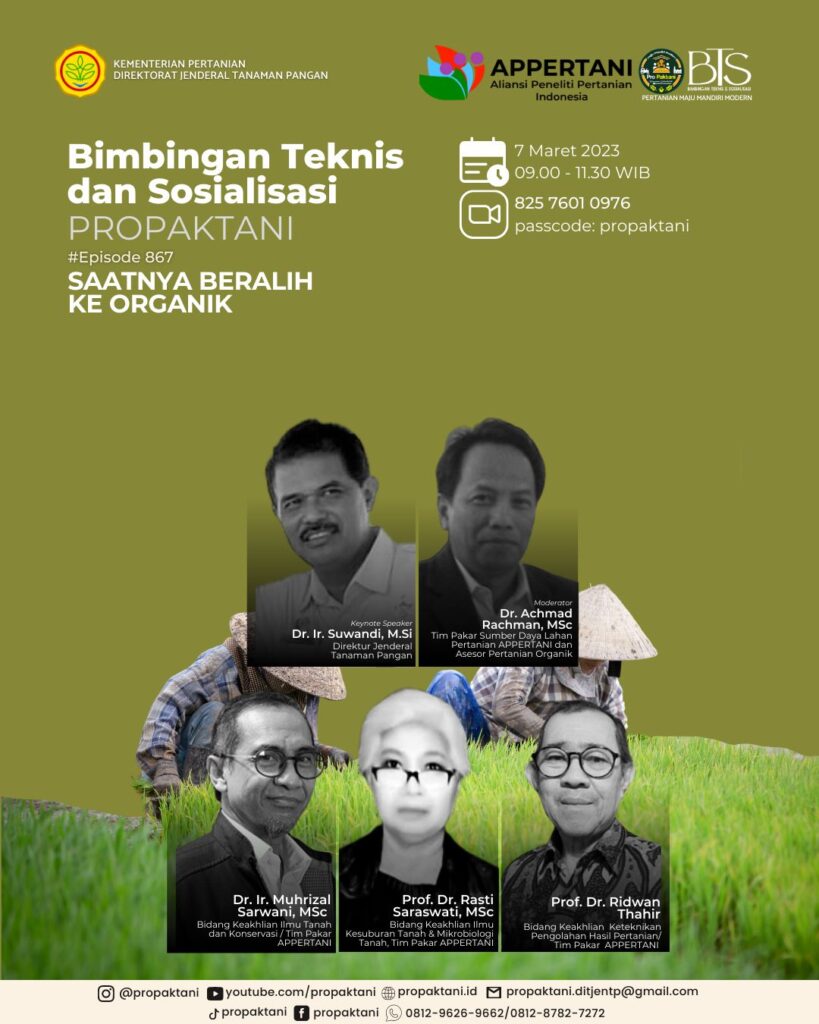Online Socialization and Technical Guidance (WEBINAR) #EPISODE 867 PROPAKTANI

ITS TIME GO ORGANIC
The global inorganic fertilizer crisis has aroused the anxiety of countries in the world including Indonesia to meet food needs amid the negative impacts of climate change and the threat of a food crisis because of the Russian-Ukrainian war. Russia has gas and mineral resources of fertilizer materials to meet the macronutrient needs of plants. Ukraine is the world’s food granary country exporting wheat, including to Indonesia. APPERTANI had the opportunity to organize Webinar Episode 867 on the topic: Its Time go Organic, to find a way out of the fertilizer crisis amid the threat of a food crisis. As the moderator of this episode was Dr. Achmad Rachman, M.Sc, APPERTANI Land Resources Expert Team who is also an Assessor of Organic Agriculture. Dr. Ir. Suwandi, Director General of Food Crops directed to adopt Low External Input Sustainable Agriculture (LEISA) to deal with the inorganic fertilizer crisis as well as to prevent food crises.
APPERTANI Soil and Fertilizer Expert, The Ministries of Agriculture Policy Analyst, Dr. Ir. Muhrizal Sarwani M.Sc outlined President Joko Widodo’s concern about the world fertilizer crisis that could trigger a food crisis at the opening of the G20 countries’ conference on November 15, 2022 due to the Russia-Ukrainian war. The world fertilizer crisis has an impact on the increase in the price of urea fertilizer and non-subsidized NPK fertilizer in Indonesia. The cause of soaring fertilizer prices is not only the impact of the prolonged Russian-Ukrainian war, but also the increase in domestic transportation costs due to the COVID-19 pandemic, the increase in raw materials and the policy of export restrictions by producing countries. Common problems of agriculture in Indonesia include the decline in land productivity since 1987, the trend of increasing productivity lower than the amount of fertilizer added and the low efficiency of fertilization. The concept of balanced fertilization is offered to achieve optimal results through the application of fertilizers into the soil with the amount and type of nutrients in accordance with the level of soil fertility and plant needs, as well as using a combination of inorganic fertilizers with organic materials or organic fertilizers. Rice straw is recommended to be used as a source of organic matter. Organic fertilizer is necessary for paddy fields in tropical areas with high rainfall. Organic fertilizers are not to replace the presence of inorganic fertilizers but to streamline or save inorganic fertilizers. Its main function is to improve soil fertility (physical, chemical, biological).
Prof. Dr. Rasti Saraswati, M.Sc. APPERTANI Soil Fertility and Microbiology Expert offers biological fertilizer as a solution to improve fertilization efficiency and decomposer of organic matter of domestic and urban waste. Biofertilizers are a group of living organisms whose activities can improve soil fertility and health, in contrast to organic fertilizers which are a set of organic materials consisting of nutrients for plants. Multifunctional biofertilizers as biofertilizers, bio- stimulants, biopesticides, bio-decomposers, and bio-remediators. Sustainable agriculture requires optimal and harmonious utilization and management of all biological resources, including the management and utilization of biomass and residues of agricultural organic matter. Biofertilizers and organic fertilizers are very important to restore decreased land productivity because the soil C-organic content is less than 2% and the soil biota is damaged which causes reduced soil fertility. In plantation plants, the application of biological fertilizers can streamline external inputs in the form of inorganic fertilizers up to 25%. Organic waste management provides added value from compost, planting media and biogas. The commercialization of biofertilizers must meet the minimum technical requirements (261/KPTS/SR.310/M/4/2019), while the minimum technical requirements for organic fertilizers are regulated by Permentan No.02/Pert/HK.060/2/2006.
Prof. Dr. Ridwan Thahir of the APPERTANI Expert Team in the Field of Agricultural Product Management Engineering, representing PT. Agro Indo Mandiri as a forum for active and retired agricultural researchers. He shared experiences of downstream biological fertilizer technology from researchers through licenses for commercialization Agrimeth and Gliocompost biofertilizers. Downstream biological fertilizers can only be carried out after meeting administrative and marketing requirements including: 1) Business Identification Number and Indonesian Business Field Standard Classification, 2) trademark registration, 3) registering for Electronic Procurement Services , 4) registering as a Government Goods/Services Procurement Policy Institute, 5) obtaining an industrial permit and 6) obtaining domestic compound level certification. Challenges faced in down streaming Agrimeth include technical challenges, production scale, packaging, packaging dosing, media storage and sterilization. The lesson learned from Agrimeth’s marketing is that farmers still prioritize the use of NPK fertilizer. Agrimeth still needs the support of government programs to be used by food crop farmers, while Gliocompost has responded well to horticultural farmers because besides being a fertilizer, it also serves to control fungal diseases, and the economic value of the product is higher. Agrimeth development efforts such as extending shelf life, microbial inoculation to media, granule formulas, field effectiveness tests and fabrication prototypes need to continue to increase market share.


